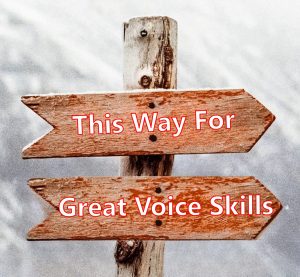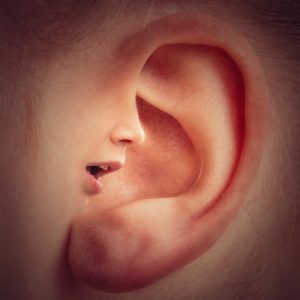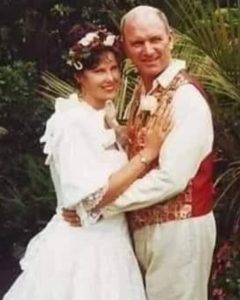Top Tips for Celebrants – 3

(In these blogs, although I use the word celebrant, the information I share applies to anyone who’s presenting a ceremony of any kind.)
Your Sunday-Best voice. Just about everybody has one. There’s nothing wrong with that as long as it just means you’re being a bit more careful than usual when you speak that way. If your Sunday Best is radically different to how you normally talk, then perhaps you’re going too far. You don’t need to go all elocution and “How now brown cow?”

It’s a good idea to record yourself in various ways from time to time. Not many celebrants do this. Why? After all, your voice is one of the tools of your trade.

One reason is that most people don’t like to hear their own voice. It may be that it’s not a pleasant sound. Another reason is that on a recording, their voice doesn’t sound how they expect. That’s because a recorder hears the same sound that everybody listening does – except for the person who did the talking. When someone is speaking, the sound comes out of their mouth, and goes into the ears of anyone listening.

The speaker also hears their own voice as it enters their ears. But! They also hear their voice as it’s conducted across their skull into their ears. The conducted sound is different to the airborne sound. What the speaker hears is a blend of the two, whereas the listeners, and any recording device, can only hear the airborne sound. That’s why when the speaker plays back a recording, it sounds different to what they expected.

As I mentioned in my first Top-Tips blog, everyone who can see, knows what they look like – for better or worse. There are mirrors everywhere! And we can see ourselves in video calls, even shop windows. But there’s no easy equivalent for the voice. You have to make an effort to record yourself to do that. Improving your voice takes work (and guidance).

And it’s easy to quietly forget about improving your voice and communication skills. Barmy, but true! Can you imagine a sprinter who doesn’t practise running? A surgeon with poor cutting skills? A singer who doesn’t fine-tune their voice and interpretation? As far as I can work out, many celebrants are barely trained in presentation skills – so it’s not surprising that they don’t try to attain and maintain the sort of high standards to which other professionals aspire. Anyway, recording yourself! When and why? Try it when you’re in conversation.

At first, you may be a bit self-conscious, but you’ll soon forget about being recorded once the chat gets going. The point of this is to hear what you sound like when you’re not thinking about it (your unguarded voice); to hear if you have any mannerisms including saying things such as “you know”; “obviously”; “like”; “right?”; “er”; and so on; and to hear if there’s anything about your voice you’d like to change.
You might be thinking that when presenting a ceremony, you’d be more careful about your speech (Sunday Best?), and that you wouldn’t have any of those mannerisms or fillers in your script. But what about when you’re speaking to your clients? Obviously, how you come across to them is important – especially if it’s an initial meeting where you want to make a good impression so that they’ll commit to using you.
In the previous blog in this series, I mentioned that the human ear has certain expectations when it comes to sound.

In the brain’s ideal world, amongst other things, it craves pleasant sounds and natural variety – a sort of unforced melodiousness. A technical way of achieving this is to try and get variety of the 3 Ps when you’re presenting. This already sounds complicated – and it is. (Don’t worry, I have a way of making things more straightforward!) The 3 Ps are Pace, Pitch and Pause. And there’s another variable to be taken into account, but it doesn’t begin with P, so it didn’t make the cut! This 4th one is Volume.

If you analyse how someone making a brilliant presentation is speaking, you’ll hear exactly what I’ve just mentioned: variety of Pace, Pitch, Pause and Volume. But can you imagine presenting a beautifully crafted script while trying to remember whether you’ve recently changed pace, put in some pauses, gone up and down in pitch, and varied your volume? Without a heck of a lot of rehearsal, it’d be like wading through treacle!

There’s an effective way of achieving excellent results, which once you’ve got it under your belt, will make the process much simpler, more enjoyable, and can help you raise the quality of your ceremonies out of sight – well, hearing! I’ll get into it in the next blog in this Top-Tips series. But here’s something for you to try in order to take the first steps in this direction. I’d like you to record yourself reminiscing about a pleasant memory for a minute or two. Imagine that you’re sharing this recollection with a friend.

When you play it back, you’ll almost certainly find that you’ve instinctively found variety of the 3 Ps and V. Feel free to try other memories until you’re reasonably happy with the spontaneous sound you’re achieving. Then, write down about a minute of one of your reminiscences. Edit out any ums and ahs. Then try and recreate it by recording yourself reading it, but with the feel of the spontaneity of the original. It’s a tall order, but next time, I’ll show you how this can be achieved.

Many years ago, a dear, five-year-old bright-as-a-button boy inspired my wife to say to him “If I ever have a little boy, I’d like him to be just like you.” His excited reply was priceless: “And I’ll teach him everything I know!” It brings a huge smile to my face every time I think of that. He knew a heck of a lot for a five-year-old. Well, I’m a bit older than that, but that’s how I feel about what I do. I want to teach you everything I know! So, I hope you’re getting something worthwhile out of these tips. There are many more to come. Feel free to share the links. I work with people from many walks of life, but my absolute favourite is to engage with celebrants and celebrants-in-training. If you’re thinking about one-on-one guidance, my details are below. And here’s a link to the first blog in this Top-Tips series. Top Tips For Celebrants -1 – Paul Robinson Voice Coaching
07469 957 199 (+44 7469 957 199)